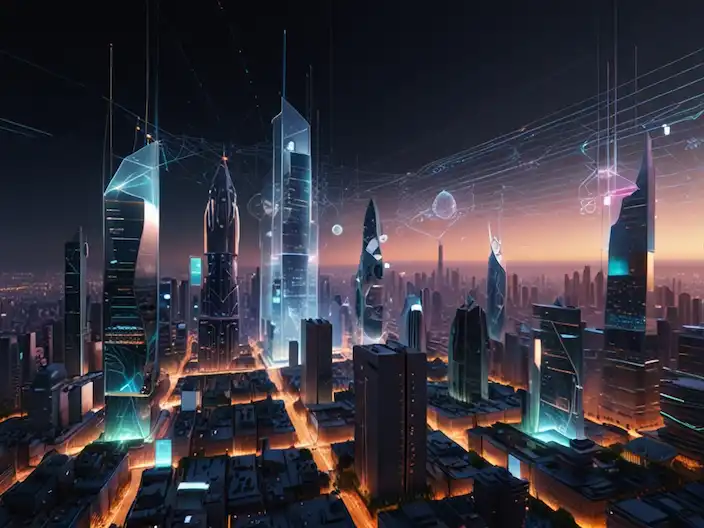- Introduction
- What is the Metaverse?
- Predictions for the Future of the Metaverse
- Significant User Growth
- Development of Related Technologies
- Expansion of Metaverse Applications
- Formation of a Digital Economy
- Impacts of the Metaverse on Society
- Changes in Lifestyles
- Ethical and Legal Issues
- Psychological Impacts
- Educational and Empowerment Opportunities
- Impacts of the Metaverse on Various Industries
- Gaming and Entertainment Industry
- Education Industry
- E-commerce Industry
- Medical and Healthcare Industry
- Challenges and Solutions
- Technical Infrastructure
- Security Issues
- Social and Cultural Issues
- Economic Issues
- Conclusion
Introduction
In today’s digital world, the metaverse is emerging as one of the significant and popular phenomena. The metaverse is a complex and expansive virtual world where people can interact, engage in various activities, and even establish their businesses. This concept is rapidly expanding, and it is expected that in the near future, it will have profound impacts on society and various industries. This article examines the future of the metaverse, its predictions and outlooks, and its potential impacts on society and various industries.
What is the Metaverse?
The metaverse refers to a vast, multi-dimensional virtual world where individuals can interact with each other. Users can create virtual characters (avatars), explore different locations, interact with others, and even engage in business and trade within these environments. The metaverse goes beyond just video games or social networks; it is evolving into a digital ecosystem where people can live.

Predictions for the Future of the Metaverse
- Significant User Growth
One of the main predictions for the metaverse is the significant growth of its user base. With technological advancements and increased access to high-speed internet, it is expected that the number of metaverse users will rise substantially. This growth will turn the metaverse into a primary platform for communication, entertainment, and commerce.
- Development of Related Technologies
The development of technologies related to the metaverse, including virtual reality (VR), augmented reality (AR), and blockchain, will play a crucial role in its expansion. These technologies are expected to continuously improve, offering more capabilities to users. For instance, advancements in computer graphics and data processing can enhance user experience and make the metaverse more realistic.

- Expansion of Metaverse Applications
Metaverse applications are rapidly expanding, and this trend is expected to continue. Besides games and entertainment, the metaverse can play roles in various fields such as education, e-commerce, healthcare, and even e-government. This broad range of applications will increase user interactions and dependency on this virtual world.
- Formation of a Digital Economy
One of the most important predictions about the metaverse is the formation of a new digital economy. In this economy, people can buy and sell virtual goods and services using digital currencies. This digital economy could gradually become a significant part of the global economy, creating new opportunities for businesses and entrepreneurs.
Impacts of the Metaverse on Society
- Changes in Lifestyles
The metaverse may cause significant changes in individuals’ lifestyles. As the metaverse expands, people might spend more time in the virtual world, potentially participating in work or educational environments through their avatars instead of being physically present. These changes could lead to cultural and social transformations in society.

- Ethical and Legal Issues
The expansion of the metaverse will also bring about new ethical and legal issues. Intellectual property rights within the metaverse, user privacy, and data security are some of the challenges society must address. Additionally, new laws and regulations will be needed to manage activities within the metaverse.
- Psychological Impacts
One of the primary concerns about the metaverse is its psychological impact on users. Spending excessive time in the virtual world can lead to social isolation, depression, and other psychological problems. Therefore, there is a need for awareness and appropriate solutions to address these challenges.

- Educational and Empowerment Opportunities
Despite the challenges, the metaverse can provide new opportunities for education and empowerment. For example, holding educational classes in virtual environments using augmented reality can enhance learning experiences and increase access to education for everyone.
Impacts of the Metaverse on Various Industries
- Gaming and Entertainment Industry
Undoubtedly, one of the industries that will see the most significant impact from the metaverse is the gaming and entertainment industry. The metaverse allows game developers to create expansive, interactive virtual worlds where millions of users can interact. This industry can leverage the metaverse to offer new and diverse experiences to users.
- Education Industry
The metaverse can significantly impact the education industry. Creating virtual educational environments where students can actively participate is one of the new opportunities the metaverse offers. These environments can enhance educational experiences and increase access to educational resources for everyone.
- E-commerce Industry
The metaverse can become a new platform for e-commerce. With virtual stores and digital showrooms, businesses can offer their products and services interactively and realistically. These changes can improve the shopping experience and attract more customers to e-commerce.
- Medical and Healthcare Industry
The medical industry can also benefit from metaverse-related technologies. For example, doctors can use augmented and virtual reality to examine and treat patients. Additionally, medical training in virtual environments can help doctors and medical students improve their skills.

Challenges and Solutions
- Technical Infrastructure
One of the main challenges in developing the metaverse is the need for advanced technical infrastructure. Creating and maintaining a vast, interactive virtual world requires substantial resources, including processing power, internet bandwidth, and storage space. Therefore, there is a need to develop and improve these infrastructures.
- Security Issues
As the metaverse expands, security issues will also increase. Protecting user privacy, preventing unauthorized access, and managing risks associated with commercial activities in this world are some of the security challenges that need to be addressed. Developing appropriate security solutions and establishing necessary standards can help reduce these challenges.

- Social and Cultural Issues
The development of the metaverse can lead to new social and cultural issues. For example, social interactions in the virtual world may reduce human connections in the real world. Additionally, there is a need to preserve cultural diversity and prevent negative cultural impacts in this environment.
- Economic Issues
The formation of a digital economy in the metaverse may lead to new economic challenges. These challenges include issues related to taxation, pricing of virtual goods and services, and managing digital currencies. Setting appropriate regulations and creating legal frameworks can help better manage these challenges.
Conclusion
As one of the significant phenomena in the digital world, the metaverse can have profound impacts on society and various industries. Despite technical, security, social, and economic challenges, it creates new opportunities for innovation and transformation in areas such as education, entertainment, commerce, and communication. Through the metaverse, unique experiences and new interactions between individuals and organizations are possible, which can improve the quality of life and efficiency of various processes. Ultimately, the metaverse has the potential to become one of the key tools for sustainable development and advancement in the digital world.
Table of Contents
Toggle

One Response